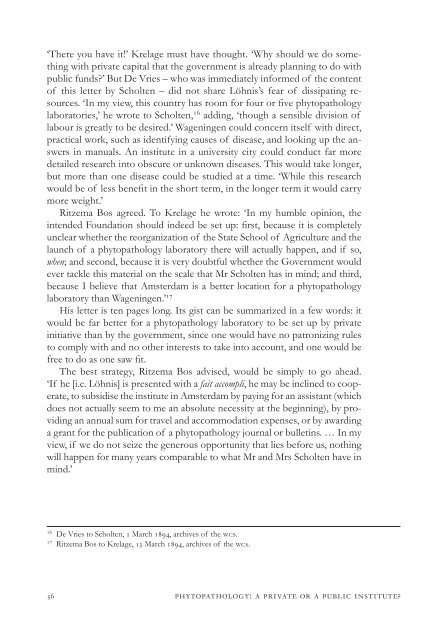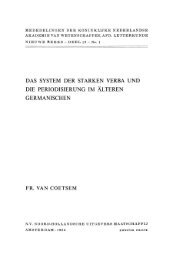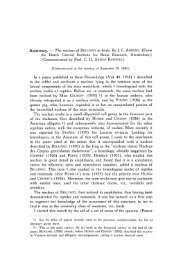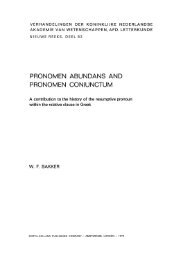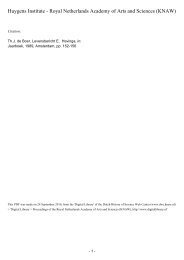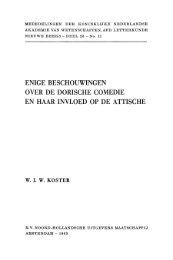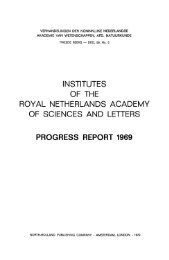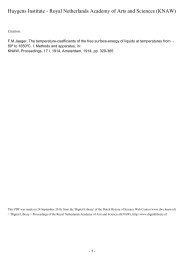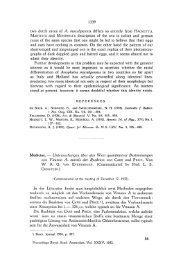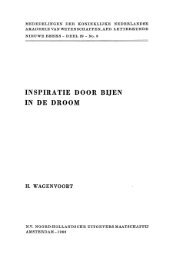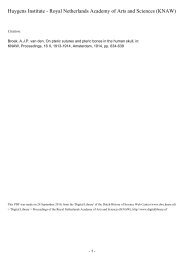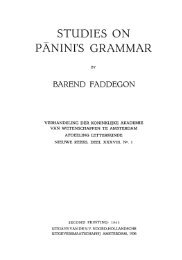- Page 1 and 2: In splendid isolation
- Page 3 and 4: In splendid isolation A history of
- Page 5 and 6: Contents Prologue 1 1 what did will
- Page 7 and 8: Prologue Seven Women and a Diseased
- Page 9 and 10: The reason for this association, wh
- Page 11: I was well aware by then that the h
- Page 14 and 15: household, next to which is a café
- Page 16 and 17: Cover of a leafl et on the Royal We
- Page 18 and 19: Willie studied biology at the Unive
- Page 20 and 21: given the handwriting and the place
- Page 22 and 23: Bulb trade and bulb-growing: Ernst
- Page 24 and 25: northern to the southern Netherland
- Page 26 and 27: of self-evident importance - or so
- Page 28 and 29: ‘I immediately saw the connection
- Page 30 and 31: the dawn of the new century that he
- Page 32 and 33: central location that is easy to re
- Page 35 and 36: 2 Phytopathology: a private or a pu
- Page 37 and 38: Ernst Krelage edited the horticultu
- Page 39 and 40: forty years the Netherlands had its
- Page 41: Agriculture and Forestry in Vienna,
- Page 45 and 46: In Germany, for instance, existing
- Page 47 and 48: he greatly regretted her absence,
- Page 49 and 50: But however much Ritzema Bos may ha
- Page 51 and 52: conditions under which they were gr
- Page 53 and 54: eturned to the Netherlands, where h
- Page 55 and 56: government had given the Foundation
- Page 57 and 58: Mr and Mrs Commelin Scholten. Tijds
- Page 59 and 60: But he felt obliged to speak out, s
- Page 61 and 62: een planted out? 71 Have temperatur
- Page 63 and 64: obvious to me that Prof. R.B.’s i
- Page 65 and 66: For several years, Ritzema Bos trie
- Page 67 and 68: him for the last time in April that
- Page 69 and 70: 3 The lady from Roemer Visscherstra
- Page 71 and 72: of age. At a time when the atmosphe
- Page 73 and 74: for different reasons, 13 and Schou
- Page 75 and 76: udget and its urban location called
- Page 77 and 78: De Vries was in the vanguard of a g
- Page 79 and 80: Fungus lady Ritzema Bos permitted h
- Page 81 and 82: ulbs to rot in the ground before sp
- Page 83 and 84: way confi rming or refuting the fi
- Page 85 and 86: Here, Westerdijk’s two positions
- Page 87 and 88: Diagnostic classifi cation scheme d
- Page 89 and 90: Ministry of the Interior replied a
- Page 91 and 92: That was the epithet that she would
- Page 93 and 94:
taxonomy he had orchestrated in 191
- Page 95 and 96:
Even so, the faculty calmly maintai
- Page 97 and 98:
These negotiations had now been goi
- Page 99:
to, the board of governors of the U
- Page 102 and 103:
Inaugural address given by Westerdi
- Page 104 and 105:
kingdom. Basing ourselves on the fr
- Page 106 and 107:
The disease did not disappear as ab
- Page 108 and 109:
In splendid isolation Bea Schwarz a
- Page 110 and 111:
It must have all been rather baffl
- Page 112 and 113:
In the summer of 1920, the director
- Page 114 and 115:
Dinner celebrating Bea Schwarz’s
- Page 116 and 117:
the view from the beginning that th
- Page 118 and 119:
direct reference to Hugo de Vries
- Page 120 and 121:
Youngest servant, Jan Kiljan, in th
- Page 122 and 123:
inevitable survival of the fi ttest
- Page 124 and 125:
‘Reviewing all the points that ha
- Page 126 and 127:
as possibly and incinerate it, to p
- Page 128 and 129:
PhD thesis, primarily with a view t
- Page 130 and 131:
Westerdijk and Went listening to ra
- Page 132 and 133:
since the assistance made available
- Page 134 and 135:
hire some character from the slums.
- Page 136 and 137:
plant doctor suffers sleepless nigh
- Page 138 and 139:
eing causative agents. 27 And in th
- Page 140 and 141:
Elm disease One of these lines of r
- Page 142 and 143:
In 1934/1935, when the evidence sug
- Page 144 and 145:
proved that the disease originated
- Page 146 and 147:
Antagonism research Van Luyk, who s
- Page 148 and 149:
In various experiments it was const
- Page 150 and 151:
Advertisement for expansine. Nederl
- Page 152 and 153:
an opportunity to do so, partly bec
- Page 154 and 155:
to food production in the Netherlan
- Page 156 and 157:
The Delft researchers, as has now b
- Page 158 and 159:
friend of Germany who was deployed
- Page 160 and 161:
number of cultures from the genera
- Page 162 and 163:
the position you adopted, we noneth
- Page 164 and 165:
everywhere, we’re used to it thes
- Page 166 and 167:
again and has two small children, b
- Page 168 and 169:
professor Jo Oort on the board of t
- Page 170 and 171:
Professor Adriaan van Herk, in cons
- Page 172 and 173:
Louise Kerling, c. 1969. Reproduced
- Page 174 and 175:
changes, as a result of which it ma
- Page 176 and 177:
Everything needed for education sho
- Page 178 and 179:
‘The new wing of the old building
- Page 180 and 181:
has no choice but to have it done a
- Page 182 and 183:
converted into laboratories for phy
- Page 184 and 185:
y the conditions.’ With the aging
- Page 186 and 187:
pollen stimulated not only the grow
- Page 188 and 189:
Party celebrating Van den Ende’s
- Page 190 and 191:
frequently … that others [student
- Page 192 and 193:
period. 79 The reaction of the plan
- Page 194 and 195:
used critically, and to conduct fur
- Page 196 and 197:
A changing world Phytopathological
- Page 198 and 199:
Kerling dressed as Mistress Commeli
- Page 200 and 201:
ut today, everyone’s responsibili
- Page 202 and 203:
Koen Verhoeff, c. 1987. Reproduced
- Page 204 and 205:
spend at least an hour and a half t
- Page 206 and 207:
work in Baarn was roughly equal to
- Page 208 and 209:
Did this safeguard the continuity o
- Page 210 and 211:
Research staff and assistants in th
- Page 212 and 213:
Foundation (stw). So the project te
- Page 214 and 215:
the pathogen, and the soil fl ora.
- Page 216 and 217:
which was approved in 1983. Each of
- Page 218 and 219:
the pathogen has spread far more to
- Page 220 and 221:
Both these hypotheses were investig
- Page 222 and 223:
‘Of course everyone used the inst
- Page 224 and 225:
Student excursion to the province o
- Page 226 and 227:
But that was no reason to sit back
- Page 228 and 229:
Three in academic gowns. From left
- Page 230 and 231:
government of strong men led by Joo
- Page 232 and 233:
council, of bion, the Biology Counc
- Page 234 and 235:
and French bean.’ 71 There was no
- Page 236 and 237:
she jerks her head upwards, saying
- Page 239 and 240:
8 Charity begins at home ‘It has
- Page 241 and 242:
‘The government has basically mad
- Page 243 and 244:
that treating susceptible cultivate
- Page 245 and 246:
Even so, horticulturalists were not
- Page 247 and 248:
Mutually enhancing effects ‘Induc
- Page 249 and 250:
Resistance and susceptibility proje
- Page 251 and 252:
He pauses briefl y. ‘When Verhoef
- Page 253 and 254:
Temperature-controlled glasshouse,
- Page 255 and 256:
Yet only in June, that same executi
- Page 257 and 258:
words, the phytopathology departmen
- Page 259 and 260:
340,000 square metres. About half o
- Page 261 and 262:
Closure of Villa Java, meeting of 2
- Page 263 and 264:
Epilogue May 2005. Minuscule scars
- Page 265 and 266:
At the end of the 1980s, btl Bomend
- Page 267 and 268:
of defence mechanisms over time. Th
- Page 269 and 270:
into a discipline created by and fo
- Page 271 and 272:
promised to be capable of solving o
- Page 273 and 274:
to the Willie Commelin Scholten Phy
- Page 275 and 276:
Acknowledgements After the sale of
- Page 277:
To gain access to confi dential doc
- Page 280 and 281:
ipo Instituut voor Plantenziektenku
- Page 283 and 284:
Bibliography Appel, O. and J. Weste
- Page 285 and 286:
Grantham, C.S.L. (ed.), Agrarian or
- Page 287 and 288:
Ritzema Bos, J., ‘Het Phytopathol
- Page 289 and 290:
Theunissen, B., ‘Knowledge is pow
- Page 291 and 292:
Appendix PhD theses * = research no
- Page 293 and 294:
Mulder, D. (m), Biologisch onderzoe
- Page 295:
Dik, A.L. (f), Population dynamics
- Page 298 and 299:
Colonial Institute, 86, 87, 90, 91,
- Page 300 and 301:
Loeb, Jacques, 24 Löhnis, F.B., 35
- Page 302:
Utrecht University (uu), 3-5, 47, 8


